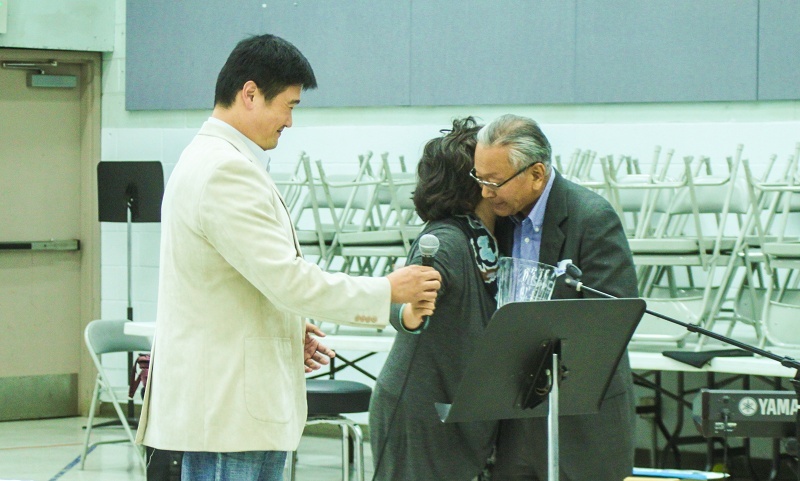

(From left to right: James Yu, Young Lee Hertig, Bill Watanabe) Bill Watanabe, the executive director of the Little Tokyo Service Center (LTSC) was given the Legacy Award at the Institute for the Study of Asian American Christianity (ISAAC)'s sixth symposium on November 3, for his extensive work to serve the Little Tokyo community.
Bill Watanabe, the Executive Director of the Little Tokyo Service Center (LTSC), was given the Legacy Award at the Institute for the Study of Asian American Christianity (ISAAC)'s sixth annual symposium on November 3.
ISAAC gives the Legacy Award to "pioneers and leaders from the Asian American Christian community." Watanabe was recognized for his exceptional community development work and the social services that he was able to provide to the community through LTSC.
Alan Nishio, the founder and co-chair of the National Coalition for Redress/Reparations, and the president for the Board of Directors for the LTSC, said that Watanabe's life "left a lasting legacy to Los Angeles, and to the Asian American community," during his remarks to honor and introduce Watanabe.
"Bill has truly been a leader and created a model for how non-profits should function as servants of the community," said Nishio, who has known Watanabe for 50 years.
The LTSC is a multipurpose social welfare agency in the Little Tokyo district in downtown Los Angeles that was started 30 years ago, and since then, has been providing services including child care, affordable housing, and community development activities.
"When Bill began LTSC, it was a one-person operation on a six-month contract," Nishio described. Despite the uncertainties and the risk of the project, "Bill felt a calling to really begin to address to serve the needs of the underserved in Little Tokyo, primarily the non-English speaking Japanese senior citizens who are neglected in terms of services they needed to be provided," Nishio said.
Watanabe, who, like Nishio, was born in the Manzanar internment camp during World War II, had a desire and calling to build an inclusive community and society, and channeled that into LTSC. Though he had been working a stable engineering job previously, he left the job to start social work, and strove to serve the underprivileged and neglected in the Little Tokyo community.
Watanabe thanked ISAAC and Young Lee Hertig, the executive director of ISAAC, as he received the award, and said that throughout the years, he's realized that "God loves Little Tokyo."
He also shared his thoughts on the symposium, which was based on the theme of race and gender this year. Watanabe was awarded during the Legacy Banquet, which took place during the first night of the two-day symposium.
"I think the greatest takeaway for me today [from this symposium], other than this beautiful vase, is that I can be the best of what America has to offer, what my Japanese American community can offer, and what a Christian living in faith"”and that's a new creation"”can offer. And frankly, I think that's really good," Watanabe remarked.
LTSC is currently looking forward to building a recreational facility in Little Tokyo that would allow various people to come and gather to play sports, learn martial arts, and engage with each other. Though LTSC is looking at a $20 million budget for the project, Nishio said that they've raised more than half of the budget thus far, and that they are expectant to see it become a reality.
Watanabe wrote Miracles in Little Tokyo, in which he recounts his experiences and testimonies while serving the Little Tokyo community through LTSC, and has served on the ISAAC board for five years. He received a bachelor's degree in mechanical engineering at California State University, Northridge, and a master's degree in social work at the University of California, Los Angeles.


















